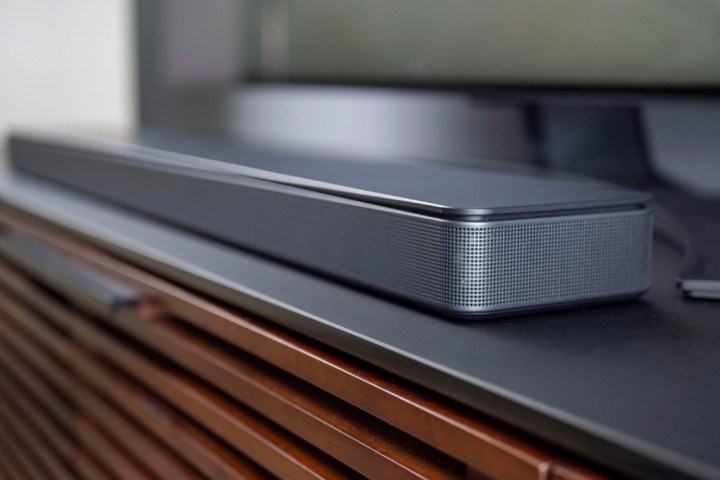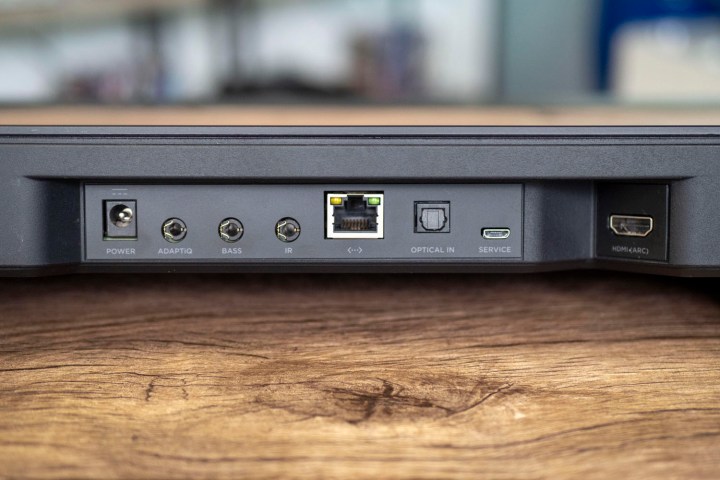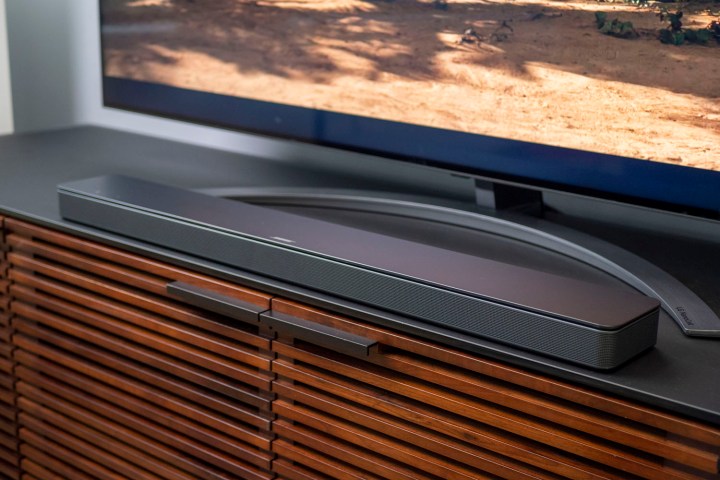- Clear and balanced sound
- Choice of Google Assistant or Alexa
- Intuitive, rock-solid app
- AirPlay 2 included
- No subwoofer leads to a lack of punch
- No spare HDMI inputs
There are few companies that do minimalism and “cool” in the same stratosphere as Apple. In recent years, Bose has become one of them. Once relegated to professional pilot gear and infomercial CD players, Bose has rebranded of late to become one of the more stylish and experiential brands in audio. The company’s latest soundbars, including the Bose Soundbar 500, are prime examples.
Of course, cool costs a lot, and the Soundbar 500 will run you a not-so-cool $550. For that, you get a taut system with Wi-Fi connection, dueling smart assistants, and other modern features, but no spare HDMI inputs and not even a wireless subwoofer. Still, with sound this clear and style this clean, it’s an enticing package for the minimalist set.
Good-lookin’ sandwich
The Soundbar 500 sets its minimalist tone from the get-go, with tight packaging that bundles everything you need, including an HDMI cable for connection; a stubby, rubberized remote with batteries; and an odd little halo that looks like a pair of headphones without the “phones” part (more on that later).

Slipping the bar from the box reveals a remarkably slim and compact slab of sound in all black that stands just two inches tall and less than 32-inches long. Matte plates at the top and bottom meet a rounded metal grille in the middle, making it look a bit like a licorice-flavored ice cream sandwich — in a good way. Behind the grille are three oval-shaped, front-facing drivers in the center flanked by side-firing drivers set at an angle to expand the soundstage beyond the bar’s short profile. The whole package feels well-made in your hands and smartly designed, as you’d expect from Bose.
At the back, you’ll find a small bass port on one side and a cubby at the center with a mix of standard and not-so-standard inputs. In keeping with the minimalist theme, there aren’t a lot of connection choices for the Soundbar 500, which is limited to digital optical and HDMI ARC inputs for TV connection. There’s also an Ethernet jack to go along with Wi-Fi and Bluetooth streaming.
A remarkably slim and compact slab of sound.
Next to the power cable input rest a trio of ports designated for Bose products only. They allow for connection of Bose’s Adaptiq halo (the headphone thingy mentioned above) for tuning the bar to your room, as well as an IR repeater and a subwoofer (both sold separately).
The sub input is a nice addition, but Bose charges an extra $350 to add one, and because there’s no standard port, you can’t just tack on an old subwoofer cabinet you’ve got lying around. Bose also sells dual satellite speakers for a full surround setup, but that’s another $300, bringing the total to a startling $1,200. For that price, you can get a full Dolby Atmos system from multiple brands, and nearly two of Vizio’s SB36514-G6 5.1.4-channel Atmos systems.

Another complaint to add is the lack of any spare HDMI inputs, which means connecting via the preferred HDMI ARC method, while simplifying setup and control, will burgle a precious HDMI port from your TV. That’s minimalism to a fault in my book, as is the Soundbar 500’s lack of any hi-res processing codecs from Dolby or DTS, with only basic Dolby Digital supported.
In contrast, Yamaha’s capable YAS-209 comes complete with a subwoofer, Amazon Alexa, and a second HDMI port for less.
Setup and interface: All about that app
With such a deceptively simple-looking device, you’d think you could skip the manual and just plug in power and the included cable to your TV’s HDMI ARC input. But in doing so, you’ll miss the instructions to download the Bose Music app, which is essential for Wi-Fi connection and voice assistant setup. If you skipped ahead like me, you may also find yourself unable to connect to your network without power cycling the bar. You’ve been warned.
Once the app is installed and the bar connected, powering up emits an Apple-esque string motif, followed by the flashing gleam of the Soundbar 500’s only form of an onboard display: An LED beam that looks strikingly like the red one that donned the hood of Michael Knight’s (aka, The Hoff’s) iconic black Firebird.
As the app walks you through setup, two words of warning: First, the bar will likely require a lengthy update. Second, if you’re using Google Assistant over Amazon Alexa as your voice assistant of choice, make sure you’ve got the latest Google Assistant app or Bose’s Music App won’t find your bar at all.
The word that best defines this bar is musicality.
You’ll then need some time to put on Bose’s Adaptiq crown and play musical chairs around your sitting area as the bar is auto-tuned to your room.
The Soundbar 500’s lack of any onboard display or controls (save an all-important mic mute and power key on the top panel) may seem limiting, but features and controls are well handled by the Bose Music app and the rubberized remote respectively. Plus, connecting with HDMI ARC not only lets you control volume and power with your TV remote, but should also provide a volume indicator directly on your TV screen.
With the app, you can program up to six streaming presets, adjust EQ and other features, control other Bose smart speakers, and more. But you’ll find no EQ modes like Sports or Movie, and only the basics on the remote like power, volume, and input switching. Again, it’s a minimalist machine.
Alexa and the Goog
Alexa and Google Assistant make it easy to control basic commands with just your voice, and it’s nice to have a choice here. Voice commands include volume adjustment, muting, and streaming playback from apps like Spotify, Tune-in, and others (though no Apple Music). The onboard mics work quite well, even when the volume is pumping, awakening that thin white beam to let you know the bar is listening. You can also, of course, ask about the weather, set timers, etc. One missing feature I would have loved is the ability to change inputs.
Performance
Rich, crisp, and brilliantly refined sound are hallmarks of Bose’s popular product lineup, and the Soundbar 500 is another prime example. Perhaps the word that best defines this bar, though, is musicality. I’m not just talking about music playback either. The bar’s musical touch extends to everything you play.

That’s especially true with dialogue. The Soundbar 500’s melodic sound signature bursts through in every voice that graces the screen, whether it’s the resonant reverb of T’Challa’s voice as he wakes up in the land of his ancestors in Black Panther, or the intricacies of voices in sitcoms like The Office or Seinfeld, where the characteristics of each speaker are spread out in a floral collage of sonic colors, right down to their vocal fry.
As you’d guess, music playback is also impressive, with buttery piano, clear and warm acoustic guitar, and percussion rendered with a touch of that papery punch that fits just right with my ears. While the bar occasionally trades some organic flavor in the upper midrange and treble for a more processed, sharper clip at the attacks of instruments, it never crosses over into sibilance, making for a satisfying ride through your favorite tunes.
Speaking of streaming, I preferred using my Spotify app directly over the Bose app, because when I went to add Spotify, Bose asked for everything but my birth certificate, requiring access to virtually all account data. Luckily, Spotify Connect worked great, and there’s also AirPlay 2 for Apple Music, making it easy to bypass Bose Music and Bluetooth, too.
Frankly, the bar just can’t keep up when things get big.
The biggest failing for the Soundbar 500 is its lack of any real punch in the bass. It’s not surprising given the lack of a subwoofer, but the bar’s thin frame makes it extra difficult to produce lower frequencies — alas, physics (for the most part) must be obeyed. The midbass pumps firmly to do a solid job lighting up tunes like The Weeknd’s Starboy, but when it comes to down-and-dirty bass, it’s a no-go.
Frankly, the bar just can’t keep up when things get big, loading up a healthy helping of compression to avoid distortion, and thus rendering bombastic action scenes flatly.
As an example, the rotors of Silva’s attack helicopter ring sweetly in the final showdown of Skyfall, but the explosion of the war machine as it slams into the Scottish manor feels paper-thin. The same goes for the giant rhinos in Black Panther’s big battle, their hooves squashed into a dimensionless rumble as they lumber toward their enemies. In comparison, Yamaha’s YAS-209 offers a burly punch in both scenes, rumbling the walls and bringing the action home.
There are plenty of fine moments to explore with the Soundbar 500, especially in your rock or acoustic music catalog, but you’ll need to add a sub to get the boom. And that’ll cost you.
Our take
Bose’s small and sleek Soundbar 500 offers a sweet way to liven up your favorite TV shows and music playlists. The detail and clarity outclass most bars in its price category, and with Amazon Alexa or Google Assistant, there are plenty of hands-free ways to play. But if you’re looking for something to rumble your sofa in the heat of the moment, you’ll have to pay up.
Is there a better alternative?
Yes. While not as clear or detailed, Samsung’s MS-650 offers more balance across registers at a lower price thanks to bigger punch in the bass in a similar single-bar design — though it does present a much larger profile.
If you’re looking for a more loaded bar at an even lower price, Yamaha’s $350 YAS-209 offers solid performance across frequencies, bigger punch down low thanks to a wireless subwoofer, and tons of features like virtual surround and an extra HDMI input.
How long will it last?
A simple bar that’s extremely well built, the Soundbar 500 should be a fine companion to your TV for the foreseeable future.
Should you buy it?
If you’re a minimalist kind of listener — and you’re not so big on action films — yes. The Soundbar 500 is a pricey bar, no doubt, but it’s also got a sexy design, modern features, and a well-designed interface to go along with detailed sound, just as you’d expect from Bose. That said, you can get a lot more punch for less from the likes of Yamaha, Samsung, Klipsch, and others.




